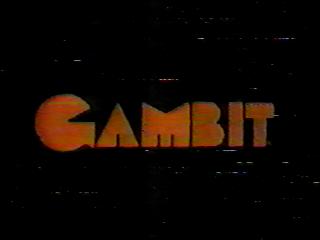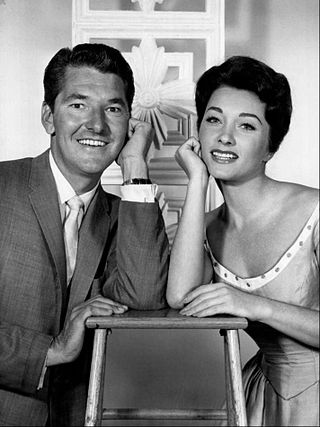The year 1966 in television involved some significant events. Below is a list of television-related events in that year.
The year 1964 in television involved some significant events. Below is a list of television-related events which occurred in that year.

Bewitched is an American fantasy sitcom television series that originally aired for eight seasons on ABC from September 17, 1964, to March 25, 1972. It is about a witch who marries an ordinary mortal man and vows to lead the life of a typical suburban housewife. The show was popular, finishing as the second-rated show in America during its debut season, staying in the top ten for its first three seasons, and ranking in eleventh place for both seasons four and five. The show continues to be seen throughout the world in syndication and on recorded media.

Bernard Shalom Kotzin, known as Stubby Kaye, was an American actor, comedian, vaudevillian and singer, known for his appearances on Broadway and in film musicals.

Gambit is an American television game show based on the card game blackjack, created by Heatter-Quigley Productions. The show originally ran on CBS from September 4, 1972, to December 10, 1976, and was recorded at CBS Television City in Studios 31, 33, 41, and 43. On October 27, 1980, NBC revived the show as Las Vegas Gambit, as a replacement for The David Letterman Show, and kept it on its schedule until November 27, 1981. As the title implied, this edition of Gambit was recorded in Las Vegas at the Tropicana Las Vegas. Both versions were hosted by Wink Martindale and announced by Kenny Williams. Elaine Stewart was the card dealer for the CBS version, while Beverly Malden filled this role for the first half of Las Vegas Gambit, and was later replaced by Lee Menning.

High Rollers is an American television game show that involved contestants trying to win prizes by rolling dice. The format was based on the dice game shut the box.
Heatter-Quigley Productions was an American television production company that was launched in 1960 by two former television writers, Merrill Heatter and Bob Quigley. After Quigley's retirement, the company became Merrill Heatter Productions.

Four Star Television, also called Four Star International, was an American television production company. Founded in 1952 as Four Star Productions by prominent Hollywood actors Dick Powell, David Niven, Charles Boyer, Ida Lupino and Joel McCrea, it was inspired by Lucille Ball and Desi Arnaz founding Desilu Productions a year earlier. McCrea left soon after its founding to continue in films, television and radio, and was replaced by Ida Lupino as the fourth star—although Lupino did not own stock in the company.

Video Village is an American television game show produced by Heatter-Quigley Productions, which aired on the CBS network in daytime from July 11, 1960, to June 15, 1962, and in primetime from July 1 to September 16, 1960. It was notable for the use of its unique "living board game" concept and for premiering soon after the quiz show scandals.
Kenny Williams or Ken Williams, born Kenneth Williams Fertig Jr. in Edmonton, Alberta, Canada, was an announcer for American television from the late 1940s to 1980s. He was best known as the announcer of many game shows produced by Merrill Heatter and Bob Quigley. He also appeared on screen as "Kenny the Cop" on Video Village and Shenanigans. He did one show for Mark Goodson-Bill Todman Productions, Two for the Money, in 1952. As a radio actor in the 1940s to 1950s, he appeared on shows such as X Minus One, where he played Rhysling on the episode "The Green Hills of Earth". He was also one of the announcers for the Buck Rogers radio program, among others. He died at home in Los Angeles, California, on February 16, 1984.
Two for the Money is an American game show television program which ran from 1952 to 1957. The show ran for one season on NBC, and four seasons on CBS. It was a Mark Goodson-Bill Todman production, and was initially sponsored by Old Gold cigarettes. Humorist Herb Shriner was the host for most of the show's run, with fellow humorist Sam Levenson hosting the last season. The game show was initially directed by Paul Alter.
The following is the 1958–59 network television schedule for the four major English language commercial broadcast networks in the United States. The schedule covers primetime hours from September 1958 through March 1959. The schedule is followed by a list per network of returning series, new series, and series cancelled after the 1957–58 season.
PDQ and Baffle are American television game shows created by Heatter-Quigley Productions. Both shows' objective was for contestant/celebrity teams to guess a given word or phrase in the shortest amount of time with the fewest letters given as possible.

Korg: 70,000 B.C. is a 30-minute Saturday morning live-action television series created by Fred Freiberger and produced by Hanna-Barbera Productions; it was broadcast on ABC from September 7, 1974, to August 30, 1975.

Lost television broadcasts are mostly those early television programs which cannot be accounted for in studio archives usually because of deliberate destruction or neglect.
In regard to children's programming, the American Broadcasting Company (ABC) has aired mostly programming from Walt Disney Television or other producers. This article outlines the history of children's television programming on ABC including the various blocks and notable programs that have aired throughout the television network's history.

Jonny Quest is an American animated science fiction adventure television series about a boy who accompanies his scientist father on extraordinary adventures. It was produced by Hanna-Barbera Productions for Screen Gems, and was created and designed by comic book artist Doug Wildey.
Funny You Should Ask is an American television panel game show that aired from 1968 to 1969 on ABC. Hosted by Lloyd Thaxton, it was a comedy game show featuring celebrities, and aired as part of a programming block that also included The Newlywed Game and The Dating Game. The series debuted on October 28, 1968, and was produced by Heatter-Quigley Productions.
Merrill Gabriel Heatter was an American television producer and writer. He was best known for his collaboration with writer Bob Quigley for over 20 years and the formation of their production company Heatter-Quigley Productions in 1960. The company was responsible for the game shows Hollywood Squares and Gambit and the animated television series Wacky Races.









